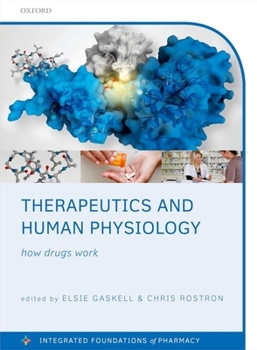Therapeutics and Human Physiology: How Drugs Work
Taking medication is a common occurrence for many people, whether it is to soothe an aching head, regulate blood sugars, or to treat life threatening conditions, such as HIV or cancer. In the UK alone, over 900 million prescriptions are dispensed every year. Overseeing all of this are pharmacists: experts in medicines and their use. The Integrated Foundations of Pharmacy series supports those who are at the beginning of their journey to become a pharmacist. The reader will begin to understand how a drug molecule is made; the process that turns it into a medicine; the role the pharmacist has when dispensing that medicine; and what happens in the body when it is taken. Most importantly, the series shows how each of these aspects are integrated, reflecting the most up-to-date teaching practices. Therapeutics and Human Physiology: how medicines work introduces the range of physiological processes occurring in the different body systems, and shows how they respond to drugs that are administered. Online Resource Centre
The Online Resource Centre to accompany Therapeutics and Human Physiology: how medicines work features: For registered adopters of the book:
- Figures from the book, available to download. For students:
- Self-assessment questions to help the reader to check and reinforce understanding of the material introduced in each chapter.
The Online Resource Centre to accompany Therapeutics and Human Physiology: how medicines work features: For registered adopters of the book:
- Figures from the book, available to download. For students:
- Self-assessment questions to help the reader to check and reinforce understanding of the material introduced in each chapter.
Format:Paperback
Language:English
ISBN:0199655294
ISBN13:9780199655298
Release Date:April 2013
Publisher:Oxford University Press, USA
Length:232 Pages
Weight:1.11 lbs.
Dimensions:0.4" x 7.7" x 10.4"
Customer Reviews
0 rating





